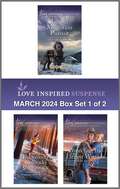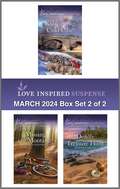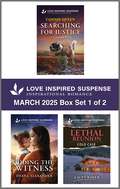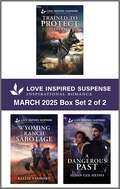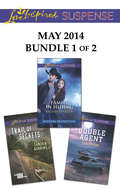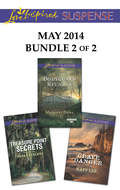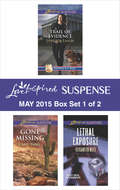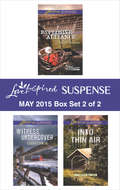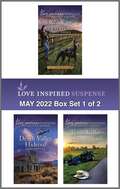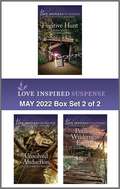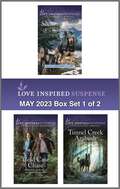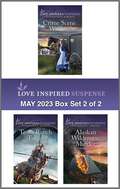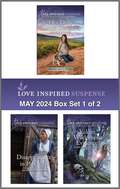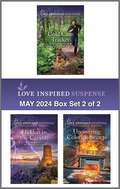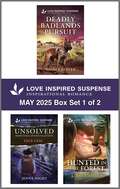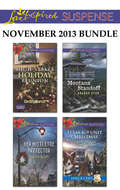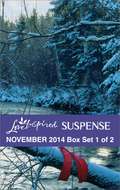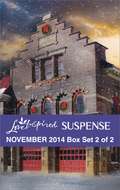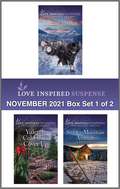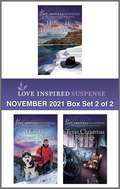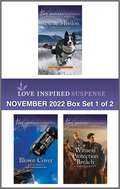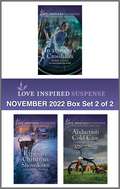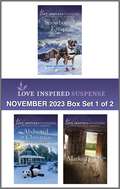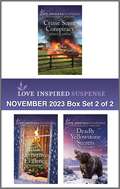- Table View
- List View
Love Inspired Suspense March 2024 - Box Set 1 of 2
by Christy Barritt Jodie Bailey Jaycee BullardLove Inspired Suspense brings you three new titles! Enjoy these suspenseful romances of danger and faith. This box set includes: LETHAL MOUNTAIN PURSUIT (A K-9 Search and Rescue novel)by USA TODAY Bestselling Author Christy BarrittAfter witnessing several murders, Natalie Pearson narrowly evades death but knows the killer is still out there…searching for her. And even a remote cabin in the Smoky Mountains can&’t keep her safe. Now she must trust Detective Andrew Moore and his K-9 to find a killer determined to silence her.UNDERCOVER COLORADO CONSPIRACYby USA TODAY Bestselling Author Jodie BaileyWhen Staff Sergeants Thalia Renner and Phillip Campbell pose as a married couple to unmask a crooked adoption ring, attacks on their lives make them wonder if their cover has been blown. But the truth is more sinister…and the consequences could make them both victims.PROTECTING THE LITTLEST WITNESSby Jaycee BullardAfter her brother-in-law is imprisoned for murdering her sister, Etta Mitchell will do anything to keep her five-year-old niece—a potential witness—safe. But when they&’re targeted by relentless killers, Etta must rely on her ex-fiancé, Steven Hunt, for protection, to untangle the mystery behind her sister&’s death…and to stay alive.For more stories filled with danger and romance, look for Love Inspired Suspense March 2024 Box Set – 2 of 2
Love Inspired Suspense March 2024 - Box Set 2 of 2
by Laura Scott Amity Steffen Sommer SmithLove Inspired Suspense brings you three new titles! Enjoy these suspenseful romances of danger and faith. This box set includes: KIDNAPPING COLD CASEby USA TODAY Bestselling Author Laura ScottTen years ago, forensic artist Jacy Urban escaped her abductor with no memory of that night. Now the kidnapper has returned, and Detective Cash Rawson is there to rescue her—again. Can Cash help her remember what she&’s forgotten…before the assailant succeeds in taking their lives?MISSING IN MONTANAby Amity SteffenForced off the road while biking, forensic accountant Holly Nichols is sure of one thing: someone wants her dead. She has no choice but to accept help from her high school sweetheart, but even Seth Montgomery&’s family ranch doesn&’t stand a chance against criminals who will stop at nothing to remain hidden…DEADLY TREASURE HUNTby Sommer SmithSheriff Caldwell Thorpe is investigating his wife&’s homicide when her cousin, Jayde Cambrey, arrives on the island of Deadman&’s Cay—drawing the predator&’s deadly attention. Believing it&’s the same person who killed his wife, Caldwell vows to protect Jayde. But can they find the truth before time runs out?For more stories filled with danger and romance, look for Love Inspired Suspense March 2024 Box Set – 1 of 2
Love Inspired Suspense March 2025 - Box Set 1 of 2
by Connie Queen Lacey Baker Deena AlexanderLove Inspired Suspense brings you three new titles! Enjoy these suspenseful romances of danger and faith.This box set includes: SEARCHING FOR JUSTICE (A K-9 Seach and Rescue novel)by Connie QueenWhen a teen goes missing from the same place where her own foster sister disappeared, K-9 handler Brynne Taylor is on the case…until she&’s caught in a lethal trap. Someone doesn&’t want her or her Saint Bernard, Fergie, snooping around, and they&’re willing to kill to keep their secrets. Saved by rancher Jace Jackson, Brynne reluctantly accepts the single father&’s help solving both cases. But they&’re under fire every dangerous step of the way—and eluding this killer may be as impossible as outrunning Brynne&’s past…HIDING THE WITNESSby Deena AlexanderRacing into a burning cabin to search for survivors, firefighter Diana Cameron stumbles upon an unconscious child—and two bodies with bullet wounds. When a sniper targets their narrow escape, Diana has no choice but to team up with bodyguard Chase Mitchell to keep the little girl safe. Uncovering the identity of the murder victims is the only way to find the killer. But as they&’re chased by gunmen into the mountain wilderness, can they protect a tiny witness from the unknown…when the truth is more sinister than they imagined?LETHAL REUNIONby USA Today bestselling author Lacey BakerThe last thing Halle Jefferson expects is to receive a chilling threat at her high school reunion—or the gunshot that follows. It&’s been fifteen years since her sister&’s unsolved homicide, and now her twin&’s killer is back. They want something from Halle, and they&’ll stop at nothing to get it. And the only thing standing between her and certain death is her ex-high school sweetheart, Sheriff Kyle Briscoe. Can Halle and Kyle outwit a ruthless murderer and uncover the truth…before they&’re silenced for good?For more stories filled with danger and romance, look for Love Inspired Suspense March 2025 Box Set – 2 of 2
Love Inspired Suspense March 2025 - Box Set 2 of 2
by Susan Gee Heino Kellie VanHorn Terri ReedLove Inspired Suspense brings you three new titles! Enjoy these suspenseful romances of danger and faith.This box set includes: TRAINED TO PROTECTby Terri ReedK-9 officer Tarren McGregor never imagined that a cartel would find its way to Texas&’s South Padre Island—or target his best friend&’s sister. But when Julia Hamilton witnesses and prevents the kidnapping of a teen girl, Tarren knows that trouble is soon to follow. Because Julia didn&’t just protect the girl—she saw the abductor&’s face. Now she&’s marked for murder, and it&’s up to Tarren and his K-9 partner to keep Julia safe from the human traffickers in pursuit…even if it means putting themselves in the line of fire.WYOMING RANCH SABOTAGEby Kellie VanHornDesperate to rescue her horses from a suspicious fire, rancher Sadie Madsen suddenly finds herself trapped inside the burning barn instead. She&’s saved by the one man she never wanted to see again—her ex-fiancé, Jesse Taylor. Unable to ignore the string of recent &“accidents&” on her property, Sadie reluctantly accepts the park ranger&’s help. But as they investigate and discover family secrets, the attacks escalate. Dangerous killers want Sadie&’s land, and luring the culprits into the open is their only hope of escaping a deadly conspiracy…A DANGEROUS PASTby Susan Gee HeinoWhen police officer and chaplain Gabe Elliot hears a disturbing deathbed confession, he turns to the one person who can help—the fiancée he left behind ten years ago. As the small town&’s archivist, Brinna Jenson has the skills to investigate the fifty-year-old murder. And she&’s determined to find out whether her best friend&’s dying grandfather is responsible for covering up a heinous crime. But between break-ins and threats, a shadowy figure pursues them. If Brinna and Gabe want to claim their second chance at love, they&’ll have to survive…For more stories filled with danger and romance, look for Love Inspired Suspense March 2025 Box Set – 1 of 2
Love Inspired Suspense May 2014 - Bundle 1 of 2
by Valerie Hansen Sandra Robbins Lisa PhillipsLove Inspired Suspense brings you four new titles for one great price, available now! Enjoy these contemporary heart-pounding tales of suspense, romance, hope and faith. This Love Inspired Suspense bundle includes Family in Hiding by Valerie Hansen, Trail of Secrets by Sandra Robbins and Double Agent by Lisa Phillips.More of the suspense you love-now Love Inspired Suspense brings you six new titles, in two convenient bundles!...."Look for six new inspirational suspense stories every month from Love Inspired Suspense!
Love Inspired Suspense May 2014 - Bundle 2 of 2
by Margaret Daley Katy Lee Sarah VarlandLove Inspired Suspense brings you four new titles for one great price, available now! Enjoy these contemporary heart-pounding tales of suspense, romance, hope and faith. This Love Inspired Suspense bundle includes Bodyguard Reunion by Margaret Daley, Grave Danger by Katy Lee and Treasure Point Secrets by Sarah Varland.More of the suspense you love-now Love Inspired Suspense brings you six new titles, in two convenient bundles!...."Look for six new inspirational suspense stories every month from Love Inspired Suspense!
Love Inspired Suspense May 2015 - Box Set 1 of 2
by Lynette Eason Camy Tang Elisabeth ReesMore of the suspense you love--now Love Inspired Suspense brings you six new titles, in two convenient box sets! Enjoy these contemporary heart-pounding tales of suspense, romance, hope and faith. This Love Inspired Suspense box set includes Trail of Evidence by Lynette Eason, Gone Missing by Camy Tang and Lethal Exposure by Elisabeth Rees.Look for 6 new inspirational suspense stories every month from Love Inspired Suspense!
Love Inspired Suspense May 2015 - Box Set 2 of 2
by Debra Cowan Susan Sleeman Mary Ellen PorterMore of the suspense you love--now Love Inspired Suspense brings you six new titles, in two convenient box sets! Enjoy these contemporary heart-pounding tales of suspense, romance, hope and faith. This Love Inspired Suspense box set includes Explosive Alliance by Susan Sleeman, Witness Undercover by Debra Cowan and Into Thin Air by Mary Ellen Porter.Look for 6 new inspirational suspense stories every month from Love Inspired Suspense!
Love Inspired Suspense May 2022 - Box Set 1 of 2
by Valerie Hansen Dana Mentink Virginia VaughanLove Inspired Suspense brings you three new titles! Enjoy these suspenseful romances of danger and faith. This box set includes: READY TO PROTECT (A Rocky Mountain K-9 Unit novel)by USA TODAY bestselling author Valerie HansenAfter witnessing a congresswoman&’s murder, wildlife photographer and mother-to-be Jamie London is forced into the protection of K-9 cop Ben Sawyer and police dog Shadow. But when they&’re tracked down by the assassin, are Ben and Shadow enough to guarantee Jamie will make it to the hearing alive? DEATH VALLEY HIDEOUT (A Desert Justice novel)by USA TODAY bestselling author Dana MentinkPlaced in the WITSEC program while his brother testifies against a terrifying criminal, Tony Ortega must guard his young niece and nephew—especially with a hitman hunting for them. Death Valley local Willow Duke&’s hideout might just be the difference between the little family&’s life or death… TEXAS KILLER CONNECTION (A Cowboy Lawmen novel)by Virginia VaughanFormer army intelligence officer Brooke Moore is determined to solve the murder of her look-alike cousin, Tessa—and now she&’s become the killer&’s next target. Blaming himself for ex Tessa&’s death, FBI Agent Colby Avery welcomes the new leads Brooke turns up. But digging deeper brings danger straight to their doorstep… For more stories filled with danger and romance, look for Love Inspired Suspense May 2022 Box Set – 2 of 2
Love Inspired Suspense May 2022 - Box Set 2 of 2
by Jill Elizabeth Nelson Laura Scott Rhonda StarnesLove Inspired Suspense brings you three new titles! Enjoy these suspenseful romances of danger and faith. This box set includes: FUGITIVE HUNT (A Justice Seekers novel)by USA TODAY bestselling author Laura ScottSurviving an attack by her serial murderer cousin years ago left police officer Morganne Kimball his number one target. Now that he&’s escaped prison, her only choice is to team up with US Deputy Marshal Colt Nelson to capture him before she becomes his next victim… UNSOLVED ABDUCTIONby Jill Elizabeth NelsonWidowed Carina Collins can&’t remember her parents&’ murder or her own kidnapping. But when her and her eighteen-month-old son are attacked in their new home, neighbor Ryder Jameson is convinced the two incidents are related. Can she put the pieces of the past together in time to live to see a future? PERILOUS WILDERNESS ESCAPEby Rhonda StarnesHot on the trail of a ruthless drug cartel, FBI Agent Randy Ingalls is nearly killed in an ambush—and left with amnesia. Can agent Katherine Lewis decipher the clues in his lost memory, or will she lose the case—and her partner—for good? For more stories filled with danger and romance, look for Love Inspired Suspense May 2022 Box Set – 1 of 2
Love Inspired Suspense May 2023 - Box Set 1 of 2
by Valerie Hansen Kerry Johnson Maggie K. BlackLove Inspired Suspense brings you three new titles! Enjoy these suspenseful romances of danger and faith.This box set includes: SCENT OF TRUTH (A Pacific Northwest K-9 story)by USA Today Bestselling Author Valerie HansenNational park ranger Brooke Stevens knows she&’s innocent of homicide, yet all evidence points to her. Officer Colt Matthews and his K-9 partner must investigate when a dead body is found in Brooke&’s backyard, but seeking the truth could prove deadly.COLD CASE CHASEby USA Today Bestselling Author Maggie K. BlackFBI agent Anthony Jones never expected the most challenging fugitive he&’d ever have to track down would be his childhood sweetheart, Tessa Watson. Framed for a crime she didn&’t commit, can Tessa trust Anthony to help her clear her name before the real killer silences her forever?TUNNEL CREEK AMBUSHby Kerry JohnsonAfter she&’s brutally attacked in Sumter National Forest, wildlife biologist Kinsley Miller must work with police officer and single dad Jasper Holt, her estranged ex-boyfriend, to figure out why she has a target on her back…before they both end up dead. For more stories filled with danger and romance, look for Love Inspired Suspense May 2023 Box Set – 2 of 2
Love Inspired Suspense May 2023 - Box Set 2 of 2
by Kathleen Tailer Virginia Vaughan Dana R. LynnLove Inspired Suspense brings you three new titles! Enjoy these suspenseful romances of danger and faith.This box set includes: CRIME SCENE WITNESS (An Amish Country Justice story)by USA Today Bestselling Author Dana R. LynnTargeted by a serial killer, single mother Lissa Paige is attacked while cleaning a crime scene. Now US marshal Micah Bender is determined to protect Lissa and her child, deciding to hide them in Amish country. Can they uncover the criminal mastermind&’s identity before Lissa becomes another victim?TEXAS RANCH TARGET (A Cowboy Protectors novel)by Virginia VaughanWhen a client is murdered under his watch, security expert Brett Harmon searches for answers to how the assailant got past his security measures. Amnesiac cybersecurity expert Jaycee Richmond just might have the information he&’s looking for…if he can keep her safe from a killer long enough for her to remember.ALASKAN WILDERNESS MURDERby Kathleen TailerNearly drowning on day one of a new expedition, kayaking tour guide Zoey Kirk assumes it&’s an accident. But Josiah Quinn trusts his military instincts and is sure they&’re not safe. With the body count rising, Zoey and Josiah must work together to unmask the culprit before they strike again. For more stories filled with danger and romance, look for Love Inspired Suspense May 2023 Box Set – 1 of 2
Love Inspired Suspense May 2024 - Box Set 1 of 2
by Lenora Worth Sharee Stover Darlene L. TurnerLove Inspired Suspense brings you three new titles! Enjoy these suspenseful romances of danger and faith.This box set includes: HER DUTY BOUND DEFENDER (A Mountain Country K-9 Unit novel)by Sharee StoverOnly seconds after widowed mother-to-be Naomi Carr-Cavanaugh is rescued from two masked gunmen, she&’s accused of multiple murders. Detective Bennett Ford believes he&’s finally apprehended the Rocky Mountain Killer—until Naomi is attacked again. Now she must rely on Bennett and his K-9 partner for protection. But with threats closing in, she&’ll have to prove her innocence first in order to stay alive…DISAPPEARANCE IN PINECRAFTby New York Times bestselling author Lenora WorthWhen Adina Maas arrives in Pinecraft to find her missing sister, she&’s blindsided by abductors who attempt to kidnap her. To her surprise, Nathan Kohr, a familiar face from her past, is there to save her. And it&’s clear that whatever trouble Adina&’s sister is in, Adina is now a target, too. But with Nathan&’s help, can they find out who&’s after the Maas sisters before Adina is the next to disappear?YUKON WILDERNESS EVIDENCE (A Crisis Rescue Team novel)by Darlene L. TurnerWhen skeletal remains are uncovered in the Yukon forest, forensic botanist Keeley Ash is called to the crime scene—and ends up abducted. She never expects her ex, paramedic Brett Ryerson, to come to her rescue, or her gathered evidence to be linked to a cold case. And when their son—whom Brett never knew existed—is kidnapped, they&’ll stop at nothing to save him and outrun the hunters determined to silence Keeley.For more stories filled with danger and romance, look for Love Inspired Suspense May 2024 Box Set – 2 of 2
Love Inspired Suspense May 2024 - Box Set 2 of 2
by Jodie Bailey Maggie K. Black Rhonda StarnesLove Inspired Suspense brings you three new titles! Enjoy these suspenseful romances of danger and faith.This box set includes: COLD CASE TRACKER (An Unsolved Case Files story)by USA TODAY bestselling author Maggie K. BlackK-9 officer Jackson Locke&’s sister has vanished—and the key to finding her lies with Amy Scout…his sister&’s best friend and his old crush. But when Amy comes under attack, two things become clear: Jackson&’s sister has been investigating cold cases and someone wants Amy dead. Now he must untangle the mystery between the cold cases and his sister&’s disappearance while guarding Amy from an enemy willing to kill to hide the truth…HIDDEN IN THE CANYONby USA TODAY bestselling author Jodie BaileyAfter Angie Garcia is attacked on her ranch near the Grand Canyon, uncovering the culprit becomes her biggest challenge. And she&’ll have to work with the last man she wants to see—Special Agent Lincoln Tucker—to investigate potential suspects. But with attacks escalating and a ranch hand missing, can they dig up the truth that links Angie to a perilous secret—and a ruthless killer—before it&’s too late?UNCOVERING COLORADO SECRETSby Rhonda StarnesWith her sister and brother-in-law murdered, it&’s up to bodyguard Adeline Scott to keep her twin nephews safe from a killer&’s crosshairs. So when an intruder breaks into their home and threatens them, she turns to her security expert boss, Linc Jameson, for help. But will they track down the answers as to what really happened before a killer strikes again?For more stories filled with danger and romance, look for Love Inspired Suspense May 2024 Box Set – 1 of 2
Love Inspired Suspense May 2025 - Box Set 1 of 2
by Kerry Johnson Jenna Night Sharee StoverLove Inspired Suspense brings you three new titles! Enjoy these suspenseful romances of danger and faith.This box set includes: DEADLY BADLANDS PURSUIT (A Dakota K-9 Unit novel)by Sharee StoverWhen Deputy US Marshal Gracie Fitzpatrick checks on a government witness, she unexpectedly walks into an ambush at Cameron Holmes&’s ranch. She and her K-9 partner, Bane, fight off the assailant—but to protect Cameron, they must escape into South Dakota&’s treacherous Badlands. Tracking dangerous enemies is what Gracie does, and Cameron&’s life in witness protection has left targets on his back. With a killer waiting in the shadows, Gracie and Cameron must work fast to uncover the truth about who wants him dead…if they want to stay alive.UNSOLVED MONTANA INVESTIGATION (A Big Sky First Responders novel)by Jenna NightWhen he rescues emergency dispatcher Clare Barlow from an armed assailant, sheriff&’s deputy Dylan Ruiz finds himself her new partner in her search to uncover her stepmother&’s killer. Digging into this cold case on her own has made Clare a target, and now she needs Dylan&’s help to solve the senseless murder—and keep her alive. Tracking down potential witnesses and evidence brings them closer to the truth, but can they evade an enemy determined to silence them both?HUNTED IN THE FOREST (A Forest Ranger Rescuers story)by Kerry JohnsonCaught in a hail of gunfire, FBI agent Eli Buchanan&’s only thought is to protect his five-year-old daughter. With no other option left, he turns to his ex-girlfriend, US Forest Service ranger Molly Calhoun, for help. Together, they flee into the Pennsylvania wilderness, but the cybercriminal targeting them is hot on their trail. As they navigate the dangers of the wild, Eli and Molly must put aside their past and team up to ensure Skylar&’s safety. Will they be able to outsmart their pursuer, or will they become his next victims?For more stories filled with danger and romance, look for Love Inspired Suspense May 2025 Box Set – 2 of 2
Love Inspired Suspense May 2025 - Box Set 2 of 2
by Lenora Worth Maggie K. Black Rhonda StarnesLove Inspired Suspense brings you three new titles! Enjoy these suspenseful romances of danger and faith.This box set includes: DANGEROUS ARSON TRAIL (An Unsolved Case Files story)by USA Today bestselling author Maggie K. BlackEmergency dispatcher Darcy Lane is abducted and left for dead in a burning house by a vengeful copycat of an arsonist she helped identify years ago. K-9 officer Lucas Harper, the man who once broke her heart, rescues her just in time. Staying one step ahead of a culprit proves nearly impossible, but Lucas will risk everything to keep Darcy safe. With the clock ticking, can they identify who&’s terrorizing her…before the cold-blooded killer&’s long-awaited revenge is complete?UNDERCOVER IN AMISH COUNTRYby New York Times bestselling author Lenora WorthAfter she helped put her criminal husband behind bars, Blythe Meissner thought she was safe—until she&’s nearly kidnapped. Now danger is following her every move and she&’s convinced the attacks are connected to her now-dead husband. Her best chance at survival lies with the former Amish man who rescued her once before, Detective Simon &“Simms&” Bueller. But when professional hit men track her to Florida, Blythe and Simms must go undercover to figure out who&’s behind the relentless threats. Can they expose a sinister agenda before deadly enemies close in?SMOKY MOUNTAIN ESCAPEby Rhonda StarnesSheriff Heath Dalton accidentally stumbles upon two gunmen trying to hide a body in the Smoky Mountains and barely escapes with his life. And when traveling nurse Kayla Eldridge finds herself stranded in the stormy wilderness with Heath, she now has a target on her back. They must work together to navigate the treacherous terrain and evade the criminals who are tracking their every move. Can they outrun their merciless hunters before they both lose their lives?For more stories filled with danger and romance, look for Love Inspired Suspense May 2025 Box Set – 1 of 2
Love Inspired Suspense November 2013 Bundle
by Laura Scott Sharon Dunn Christy BarrittLove Inspired Suspense brings you four new titles for one great price, available now for a limited time only from November 1 to November 30! Enjoy these contemporary heart-pounding tales of suspense, romance, hope and faith. This Love Inspired Suspense bundle includes High-Stakes Holiday Reunion by Christy Barritt, Her Mistletoe Protector by Laura Scott, Montana Standoff by Sharon Dunn and Texas K-9 Unit Christmas by Shirlee McCoy and Terri Reed.Look for four new inspirational suspense stories every month from Love Inspired Suspense!
Love Inspired Suspense November 2014 - Box Set 1 of 2
by Lenora Worth Rachelle Mccalla Sandra OrchardMore of the suspense you love-now Love Inspired Suspense brings you six new titles, in two convenient bundles! Enjoy these contemporary heart-pounding tales of suspense, romance, hope and faith. This Love Inspired Suspense bundle includes Deadly Holiday Reunion by NEW YORK TIMES bestselling author Lenora Worth, Twin Threat Christmas by Rachelle McCalla and Identity Withheld by Sandra Orchard. Look for six new inspirational suspense stories every month from Love Inspired Suspense!
Love Inspired Suspense November 2014 - Box Set 2 of 2
by Dana Mentink Kathleen Tailer Susan SleemanMore of the suspense you love-now Love Inspired Suspense brings you six new titles, in two convenient bundles! Enjoy these contemporary heart-pounding tales of suspense, romance, hope and faith. This Love Inspired Suspense bundle includes Hazardous Homecoming by Dana Mentink, Silent Night Standoff by Susan Sleeman and Perilous Refuge by Kathleen Tailer. Look for six new inspirational suspense stories every month from Love Inspired Suspense!
Love Inspired Suspense November 2021 - Box Set 1 of 2
by Dana Mentink Karen Kirst Jessica R. PatchLove Inspired Suspense brings you three new titles! Enjoy these suspenseful romances of danger and faith. This box set includes: YUKON JUSTICE (An Alaska K-9 Unit novel)By Dana MentinkWith her ruthless uncle sabotaging her family&’s reindeer ranch, K-9 team assistant Katie Kapowski heads home to help—and thrusts herself into the crosshairs. She needs assistance, even if it comes in the form of Alaska State Trooper Brayden Ford and his furry partner. But with their rocky past, can they work together…and survive? YULETIDE COLD CASE COVER-UP (A Cold Case Investigators novel)By Jessica R. PatchWhen her sister&’s remains are found, cold case agent Poppy Holliday is determined to solve the years-old murder. But someone&’s willing to kill Poppy and her partner, Rhett Wallace, to keep the truth hidden. And it&’s up to them to dig up the small town&’s deadly secrets…without becoming the next victims. SMOKY MOUNTAIN AMBUSH (A Smoky Mountain Defenders novel)By Karen KirstSomeone wants Lindsey Snow dead by Christmas—and she doesn&’t know why. The only person she can trust to help her is the man she betrayed, mounted police officer Silver Williams. But can they figure out who is trying to kill her…before the holidays turn lethal? For more stories filled with danger and romance, look for Love Inspired Suspense November 2021 Box Set – 2 of 2
Love Inspired Suspense November 2021 - Box Set 2 of 2
by Laura Scott Katy Lee Connie QueenLove Inspired Suspense brings you three new titles at a great value, available now! Enjoy these suspenseful romances of danger and faith. This box set includes: HIDING HIS HOLIDAY WITNESS (A Justice Seekers novel)By USA TODAY Bestselling Author Laura ScottA frantic call from a witness whose safe house is breached sends US marshal Slade Brooks to Robyn Lowry&’s side. But when he reaches her, she doesn&’t remember him—or the crime she witnessed. Now going off the grid until they figure out who leaked her location is the only way to keep her alive… HOLIDAY SUSPECT PURSUITBy Katy LeeAfter a murderer strikes, deputy Jett Butler and his search-and-rescue dog must work with the sole witness—FBI agent Nicole Harrington. But Nicole&’s the ex-fiancée he left behind after a car accident gave him amnesia years ago. And unlocking his past might be just as dangerous as facing the killer on their heels… TEXAS CHRISTMAS REVENGEBy Connie QueenEmergency dispatcher Brandi Callahan believes her missing sister&’s dead—until she answers a 911 call from her. When the cryptic call leads Brandi to a little boy just as bullets fly her way, she turns to her ex, Rhett Kincaid. But can the Texas Ranger shield Brandi and the child through Christmas? For more stories filled with danger and romance, look for Love Inspired Suspense November 2021 Box Set – 1 of 2
Love Inspired Suspense November 2022 - Box Set 1 of 2
by Lynette Eason Karen Kirst Jodie BaileyLove Inspired Suspense brings you three new titles! Enjoy these suspenseful romances of danger and faith. This box set includes: RESCUE MISSION (A Rocky Mountain K-9 Unit novel)by USA TODAY Bestselling Author Lynette EasonKate Montgomery thought coming to Montana would help her recover the lost memories she needs to find her friend&’s missing baby, but someone doesn&’t want her memoires to return. K-9 handler Lucas Hudson and his dog, Angel, must protect her from a killer who will stop at nothing to keep their secrets safe. BLOWN COVERby USA TODAY Bestselling Author Jodie BaileyWhile undercover investigating a suspected arms dealer, army special agent Makenzie Fuller blows her cover to save the life of her former partner, Ian Andrews. But he can&’t remember her or that he betrayed his country. Can he recover his memories in time to escape the killer&’s clutches alive? WITNESS PROTECTION BREACHby Karen KirstWhen his neighbor and her five-year-old son are attacked, mounted police officer Cruz Castillo is determined to keep them safe. But Jade Harris&’s escaped convict ex-boyfriend is set on getting his revenge—by abducting his own son. Will Cruz be able to see past Jade&’s secrets and protect her and her little boy? For more stories filled with danger and romance, look for Love Inspired Suspense November 2022 Box Set – 2 of 2
Love Inspired Suspense November 2022 - Box Set 2 of 2
by Debby Giusti Darlene L. Turner Connie QueenLove Inspired Suspense brings you three new titles! Enjoy these suspenseful romances of danger and faith. This box set includes: IN A SNIPER&’S CROSSHAIRSby USA TODAY Bestselling Author Debby GiustiAttacked in an attempted car theft, taxi driver Lily Hudson plunges down a gorge to flee her assailant—not knowing that she&’s become his new target. Amish widower Matthias Overholt comes to her rescue, but when clues suggest the attacker is tied to a local murder, saving Lily again might be more than he can handle… EXPLOSIVE CHRISTMAS SHOWDOWN (A Crisis Rescue Team novel)by Darlene L. TurnerCriminal investigative analyst Olive Wells must move quickly to catch a killer with an explosive agenda—because he&’s now after her and her foster child. Suspecting the hit on his ex-fiancée is personal, will police constable Zac Turner and K-9 Ziva uncover the bomber&’s identity before he claims more victims? ABDUCTION COLD CASEby Connie QueenFinding a mysterious file on her desk sends psychologist Kennedy Wells chasing down clues to solve a twenty-six-year-old kidnapping cold case—and straight into a violent assault. Texas Ranger Silas Boone safeguards Kennedy and agrees to help with the investigation, but the truth could prove deadly for them both… For more stories filled with danger and romance, look for Love Inspired Suspense November 2022 Box Set – 1 of 2
Love Inspired Suspense November 2023 - Box Set 1 of 2: Box Set 1 Of 2
by Dana Mentink Kathleen Tailer Rhonda StarnesLove Inspired Suspense brings you three new titles! Enjoy these suspenseful romances of danger and faith.This box set includes: SNOWBOUND ESCAPE (A Pacific Northwest K-9 Unit novel)by USA TODAY Bestselling Author Dana MentinkCrime tech Mara Gilmore is the only eyewitness to a murder, and the real killer is determined to silence Mara for good—and frame her for the crime. Now it&’s up to Officer Tanner Ford and his K-9 partner to protect Mara from a vicious assailant…and an unforgiving icy wilderness.ABDUCTED AT CHRISTMASby Rhonda StarnesHadley Logan went into hiding to safeguard her child—but suddenly her house is breached and she&’s attacked by an intruder. With Christmas approaching, can Hadley risk everything to accept the protection security specialist Ryan Vincent offers…as a deadly enemy closes in?MARKED TO DIEby Kathleen TailerAfter her young daughter is poisoned—along with others—investigative reporter Eleni Townsend wants answers…especially when an attempt on her life is made. Now with danger on her trail, can FBI agent Chris Springfield help Eleni evade hit men long enough to discover the truth of her past?For more stories filled with danger and romance, look for Love Inspired Suspense November 2023 Box Set – 2 of 2
Love Inspired Suspense November 2023 - Box Set 2 of 2
by Jessica R. Patch Sami A. Abrams Kari TrumboLove Inspired Suspense brings you three new titles! Enjoy these suspenseful romances of danger and faith.This box set includes: CRIME SCENE CONSPIRACY (A Texas Crime Scene Cleaners novel)by Jessica R. PatchA string of staged deaths forces Texas Ranger Emily O&’Connell on a covert mission to investigate a governor&’s connection to the deceased women. No one can know what she&’s doing—including former ranger Stone Spencer. But when Emily becomes the next target, she must choose between her secrets…and her life.KILLER CHRISTMAS EVIDENCE (A Deputies of Anderson County thriller)by Sami A. AbramsWhen Detective Kyle Howard rescues a woman from a burning house, he&’s shocked that it&’s Cassidy Bowman—the detective who was responsible for his fiancée&’s death. Now Cassidy can&’t remember who she is…or just how close she is to finding a merciless serial killer.DEADLY YELLOWSTONE SECRETSby Kari TrumboNaturalist Tamala Roth finds herself targeted by a poacher in Yellowstone National Park who will stop at nothing to keep his secret. The only person she can trust is Ranger Clint Jackson. But when a blizzard traps them, will they make it out alive?For more stories filled with danger and romance, look for Love Inspired Suspense November 2023 Box Set – 1 of 2
